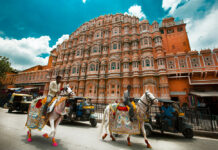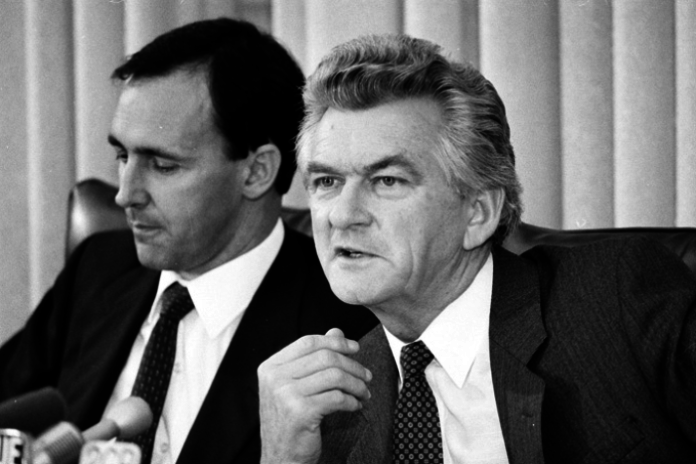Bob Hawke, Australia’s 23rd prime minister and Labor Party legend, has died at the age of 89.
Key points:
Bob Hawke was prime minister from 1983 to 1991, making him the longest-serving Labor PM
He is survived by wife Blanche d’Alpuget, and his three children — Susan, Stephen and Rosslyn
Current party leader Bill Shorten said Mr Hawke was the labour movement’s “greatest son”
Mr Hawke led the country and his party from 1983 to 1991, and his contribution to public life helped shape modern Australia.
A great conciliator, Mr Hawke’s achievements as prime minister included modernising the economy and integrating it into the global community, establishing Medicare, and championing environmental issues.
He won four federal elections, making him Labor’s longest-serving prime minister and Australia’s third-longest-serving prime minister behind Robert Menzies and John Howard.
Mr Hawke is survived by his wife and biographer Blanche d’Alpuget, and his three children — Susan, Stephen and Rosslyn.
Ms d’Alpuget released a statement saying “he died peacefully at home” and that his children, stepson Louis, and his grandchildren would hold a private funeral ahead of a memorial service in Sydney in the coming weeks.
Looking back on Bob Hawke:
Nine ways Bob Hawke’s government changed Australia
‘Any boss who sacks anyone for not turning up today is a bum’: Hawke’s memorable quotes
Seven videos capturing the Labor legend in full flight
Hawke’s life in pictures
“Bob was dearly loved by his family, and so many friends and colleagues,” the statement read.
“We will miss him.
“The golden bowl is broken.”
A leader no-one could ignore
In Bob Hawke — 23rd prime minister, true moderniser and Labor giant — Australia found a political leader the likes of which we’d never seen before.
Current Labor leader Bill Shorten tweeted that Mr Hawke was the labour movement’s “greatest son”.
“Australians everywhere remember and honour a man who gave so much to the country and people he cared for so deeply,” he said.
Prime Minister Scott Morrison sent his condolences to the family of a man who “will be greatly missed”.
“Bob Hawke was a great Australian who led and served our country with passion, courage, and an intellectual horsepower that made our country stronger,” he tweeted.
“He was true to his beliefs in the Labor tradition and defined the politics of his generation and beyond.
“He had a unique ability to speak to all Australians.”
Space to play or pause, M to mute, left and right arrows to seek, up and down arrows for volume.
VIDEO: Labor leader Bill Shorten on Bob Hawke’s passing (ABC News)
Keating mourns end of a ‘great partnership’
Mr Hawke’s legacy is closely tied to that of his famous political rival Paul Keating, who took over as prime minister and Labor leader after a 1991 leadership spill.
Mr Keating said the pair enjoyed a “great partnership” and “the country is much the poorer for Bob Hawke’s passing”.
“Bob possessed a moral framework for his important public life, both representing the workers of Australia and more broadly, the country at large,” Mr Keating said in a statement.
“He understood that imagination was central to policy-making and never lacked the courage to do what had to be done to turn that imagination into reality.
“And that reality was the reformation of Australia’s economy and society and its place in the world.”
Mr Hawke was too ill to attend the launch of the Labor Party’s election campaign earlier this month, but Mr Keating said they had spoken about their support for Mr Shorten at the upcoming election, describing it as their “last collaboration”.
“Bob, of course, was hoping for a Labor victory this weekend. His friends too, were hoping he would see this,” Mr Keating wrote.
Labor and union figures remember a legend
Australia’s first female prime minister, Julia Gillard, said Mr Hawke inspired her when she was a teenager and guided her when she was PM.
“Without question, Bob was the greatest peacetime leader Australia has ever had,” Ms Gillard said.
“And up to his very last days, he remained both an inspiration and a friend.”
Bob Hawke is a giant of Australian politics. He and Paul Keating internationalised the Australian economy. He established APEC and radically deepened Australia’s engagement with Asia. He established Medicare. Together with Therese and the entire nation, I mourn his passing.
“Bob Hawke is a giant of Australian politics,” Mr Rudd said.
WA Governor and former federal Labor leader, Kim Beazley, said the country had “lost a really great Australian”.
Western Australia Premier Mark McGowan said it was a terrible loss to Australia and WA.
“I’m very sad that Bob is gone, he was one of the heroic figures of my lifetime and I always appreciated his advice and support,” Mr McGowan said.
Before becoming prime minister, Mr Hawke served as president of the Australian Council of Trade Unions (ACTU) from 1969 to 1980.
The current leaders of the ACTU said “millions of working people owe their health, prosperity and dignity in retirement” to him.
ACTU secretary Sally McManus and president Michele O’Neil described him as “a hero to working people”.
Barrie Cassidy on Hawke’s ‘special place in history’
Insiders host Barrie Cassidy, who worked as Mr Hawke’s press secretary in the 1980s, said the former PM would have a special place in history, not only as the longest-serving Labor prime minister, but also as an economic reformer.
“Together with Paul Keating, he did open up the economy to the world and that has been well documented,” Cassidy said.
How Hawke changed Australia
As prime minister for almost nine years, Bob Hawke brought in major economic and environmental reforms that endure to this day.
Cassidy said one of the things that most impressed him about Mr Hawke was that he would not cop racism.
“He just wouldn’t cop it at any level. At the very whiff of it, he’d be right on to it,” Cassidy said.
“When he worked with the ACTU, he led the campaign against the Springboks tour over Apartheid.
“When he became prime minister, I think it was the CHOGMs in 1985, 1987, without telling anybody, a few public servants, he organised sanctions against South African.
“He briefed someone from CHOGM. Years later, the foreign minister of South Africa said that was the dagger at the heart of Apartheid.”





































